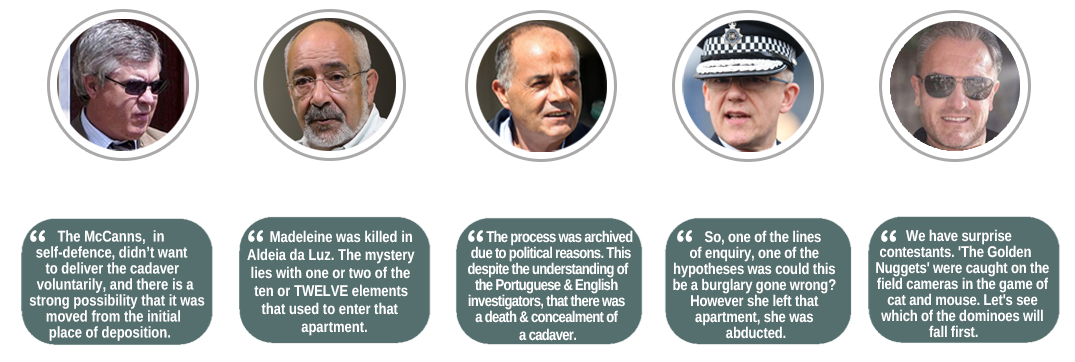Understanding the Portuguese Criminal Process
Page 1 of 1 • Share
 Understanding the Portuguese Criminal Process
Understanding the Portuguese Criminal Process
1) First thing you have to consider: the owner of a criminal investigation in Portugal is the Public Prosecution. Police forces always act under the "surveillance" of the public prosecution (represented by the Magistrate from the Public Prosecution placed in the territorial area where a crime took place).
2) There's two types of Magistrates
a) Magistrates from the Public Prosecution
b) Magistrates from Courts
The Public Prosecution always have the last word, as they are the ones who are the real "owners" of a criminal investigation.
Now, let's speak about an enquiry.The enquiry has 3 steps:
- The enquiry (generally performed by Police)
- The instruction (optional)
- The Trial
When there's an investigation going on, we are on the enquiry phase. During this stage, people are given legal status, according to their positions in the enquiry: some are witnesses, some are arguidos. When someone is given the arguido status, that's because there's something that lead to it. That status allows the suspect to protect himself/herself. An arguido can lie or stay in silence, while a witness ought to tell the truth. After all statements, forensic evidence and any other element that can be added to the files, the prosecutor must then decide to charge the arguidos or not. If the Prosecutor archives the files, all legal status both to witnesses and arguidos, are lifted and very different from cleared. Nobody is ever cleared unless there's evidence showing clearly they are innocent.
If the prosecutor charges, or if one of the parts is not satisfied with the result of the enquiry, then we can go to stage 2:
- The arguidos can ask for the "Instruction". The Instruction allows an arguido to read everything on the files, in order they can prove the evidence against them, is wrong. In this phase the "arguido(s)" bring all evidence they can to the files, to prove they have not commited any crime. After this phase, the Prosecutor (after pondering on the new facts from the Instruction), can still charge or archive.
If there's a charge, the case goes to Trial.
If the case is archived, it's only open after new evidence is brought to the files.
2) There's two types of Magistrates
a) Magistrates from the Public Prosecution
b) Magistrates from Courts
The Public Prosecution always have the last word, as they are the ones who are the real "owners" of a criminal investigation.
Now, let's speak about an enquiry.The enquiry has 3 steps:
- The enquiry (generally performed by Police)
- The instruction (optional)
- The Trial
When there's an investigation going on, we are on the enquiry phase. During this stage, people are given legal status, according to their positions in the enquiry: some are witnesses, some are arguidos. When someone is given the arguido status, that's because there's something that lead to it. That status allows the suspect to protect himself/herself. An arguido can lie or stay in silence, while a witness ought to tell the truth. After all statements, forensic evidence and any other element that can be added to the files, the prosecutor must then decide to charge the arguidos or not. If the Prosecutor archives the files, all legal status both to witnesses and arguidos, are lifted and very different from cleared. Nobody is ever cleared unless there's evidence showing clearly they are innocent.
If the prosecutor charges, or if one of the parts is not satisfied with the result of the enquiry, then we can go to stage 2:
- The arguidos can ask for the "Instruction". The Instruction allows an arguido to read everything on the files, in order they can prove the evidence against them, is wrong. In this phase the "arguido(s)" bring all evidence they can to the files, to prove they have not commited any crime. After this phase, the Prosecutor (after pondering on the new facts from the Instruction), can still charge or archive.
If there's a charge, the case goes to Trial.
If the case is archived, it's only open after new evidence is brought to the files.

Guest- Guest
 Similar topics
Similar topics» Yet another good one from Blacksmith
» LIBEL TRIAL DISCUSSION HERE
» Pages 2533/2534 of the Process
» McCanns’ lawyer opposes the reopening of the process
» Open Letter - Doubts on the McCann Process
» LIBEL TRIAL DISCUSSION HERE
» Pages 2533/2534 of the Process
» McCanns’ lawyer opposes the reopening of the process
» Open Letter - Doubts on the McCann Process
Page 1 of 1
Permissions in this forum:
You cannot reply to topics in this forum



































